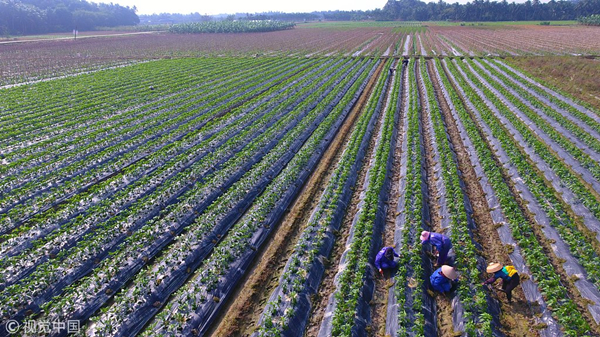Hainan rolls out regulations to safeguard seed breeding


Farmers work in Qionghai, South China's Hainan province, Dec 17, 2017. [Photo/VCG]
The Hainan Provincial Regulations on Crop Seed Management came into effect on Nov 1, highlighting the development and supervision of southern seed breeding activities, according to officials with the Hainan provincial department of agricultural and rural affairs.
Southern seed breeding, called nanfan in Chinese, refers to the practice where agricultural scientists take advantage of Hainan's unique climate conditions and species resources to conduct crop variety breeding, parental breeding, plant identification and seed production activities.
Southern seed breeding, which began in 1956, has greatly shortened the crop breeding cycle and effectively promoted the development of seed breeding in China. It has become a valuable platform for agricultural research in the country, said an official with the Hainan south seed breeding administration.
Xie Yan, deputy director of the Hainan provincial department of agricultural and rural affairs, said at a news conference on Wednesday that the regulations were the country's first local move that put development, administration and service for southern seed breeding under a regulatory framework.
For the first time, the regulations clearly define the concept of southern seed propagation and the institutions that supervise the production activities, and also provide detailed descriptions on the delineation, registration and quarantine of national scientific research and protection zones of southern seed breeding as well as the protection of intellectual property rights for seed breeding.
Every year, more than 7,000 scientists from 700 scientific research institutions move to Hainan from other parts of the country to engage in seed breeding. More than 70 percent of the nation's 7,000 new crop varieties have been bred through southern propagation and generation breeding on the tropical island, according to information from the provincial agricultural department.
The regulations also encourage institutions and individuals to import crop germplasm resources from abroad in accordance with the law, and require Hainan's agricultural authorities to strengthen cooperation with foreign germplasm resource agencies to speed up the construction of a transit base for the introduction of crop germplasm resources, which is one of the missions set by the central government for Hainan to develop as a free trade zone on the whole Hainan Island.
Introducing the regulations will guarantee the stable and efficient development of agriculture in Hainan, and make modern tropical agriculture a trump card industry for Hainan farmers to prosper and serve the whole country as well, according to Zhou Yanhua, deputy director of the Hainan provincial department of agricultural and rural affairs.
MOST POPULAR
Editors' Picks
 Infographic:
China's NEV industry performance review
Infographic:
China's NEV industry performance review
 Infographic:
China's low-altitude economy: A transformative force
Infographic:
China's low-altitude economy: A transformative force
 Infographic:
China's development in culture, tourism industries
Infographic:
China's development in culture, tourism industries
 Infographic:
China's major developments in 2024
Infographic:
China's major developments in 2024



